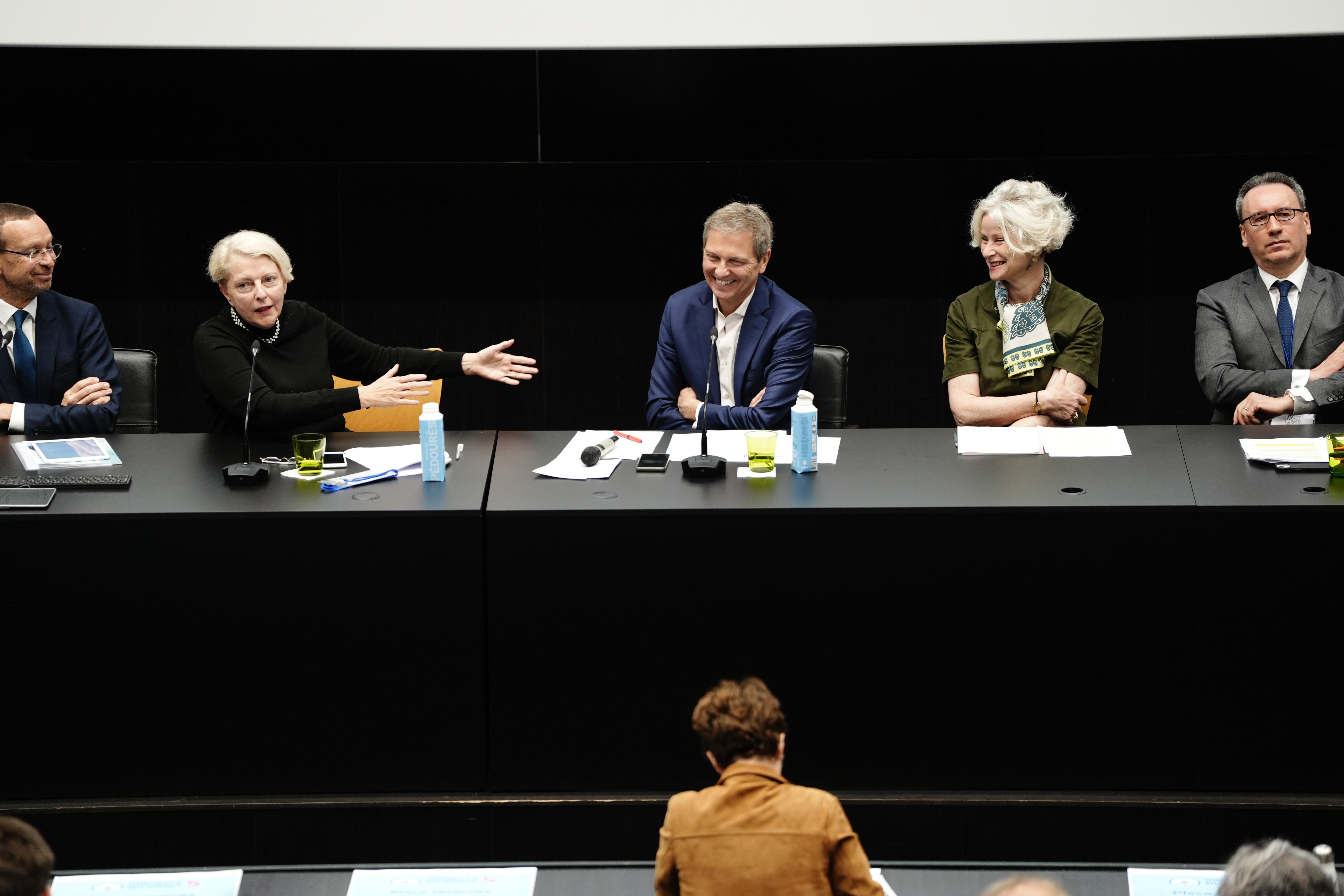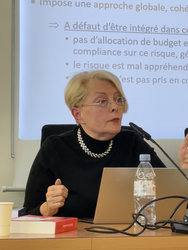The recent news
June 12, 2024
Conferences

🌐follow Marie-Anne Frison-Roche on LinkedIn
🌐subscribe to the Newsletter MAFR Regulation, Compliance, Law
____
► Full Reference: M.-A. Frison-Roche, Participation in the panel "Une Gouvernance responsable : vers un mieux vivre ensemble ?" ("Responsible governance: towards a better way of living together"), in Grenelle du Droit 5. L'avenir de la filière juridique, Association française des juristes d'entreprise ("The future of the legal profession"), AFJE), Cercle Montesquieu and Paris Panthéon-Sorbonne University, Campus Port-Royal Université Paris 1 Panthéon-Sorbonne, 1 rue de la Glacière, 75013 Paris, June 12, 2024
____
🧮See the full programme of this event (in French)
____
🎥watch the interview made just after this round-table discussion (in French)
____
🪑🪑🪑🪑🪑 will also be taking part in this round-table discussion:
🕴️Yves Garagnon, Chairman of Dilitrust,
🕴️Pierrick Le Goff, lawyer, partner at De Gaulle Fleurance,
🕴️Sabine Lochmann, Chairman of Ascend,
🕴️Vincent Vigneau, President of the Commercial, Economic and Financial Chamber of the Cour de cassation (French Judicial Supreme Court)

____
► English presentation of my intervention in this event's opening plenary round-table: In this plenary round table which opens the event, devoted to the theme of 'responsible corporate governance', for my interventions based on my work I will have the opportunity to address more particularly these different perspectives:
- How the new Compliance Law, which gives concrete expression to the responsibility of enterprises in a new relationship with States and with civil society, constitutes a 'legal revolution
- 💡for the record, mafr,📝Compliance Law, 2016 ; (ed.) 📘Compliance Monumental Goals, 2022
- how the judgment handed down by the Tribunal judiciaire de Paris (Paris First Instance Civil Court) on 28 February 2023 (Total Ouganda case) is remarkable and already constitutes a turning point in case law
- 💡for the record, mafr, 🎤audition as amica curiae, hearing of 26 October 2022 before the first instance Paris Court; (ed)📘Compliance Jurisdictionalisation, 2024
- how the relationship between States and enterprises is being renewed by this profound legal movement expressed by Compliance Law
- 💡for the record, mafr et M. Boissavy (ed.), 📕Compliance et droits de la défense - Enquêtes internes, CJIP, CRPC, mafr (dir.), 📘 Compliance Obligation, 2025
- how internal lawyers have a decisive and central role to play in this movement, particularly in the mechanism of vigilance / corporate sustainability due diligence, the "cutting edge" of Compliance Law,
- 💡for the record, mafr, 📝Contract of Compliance, Compliance stipulations, 2023 ; (ed.), 📘Compliance and Contract, 2025
- what is meant by the "Ex Ante responsibility" of enterprises, which does not necessarily entail their Ex Post liability, a distinction which lawyers are the guardians of
- 💡for the record, mafr, 📝La responsabilité Ex Ante, pilier du Droit de la Compliance ("Ex-Ante Responsability, Compliance Law Pillar"), 2021
- how European Compliance Law is profoundly humanist, an identity that distinguishes European Compliance from American Compliance and, above all, from Chinese Compliance.
- 💡for the record, mafr (ed.), 📕Pour une Europe de la Compliance ("For the Europe of the Compliance"), 2017
________
read the article about this round table written by Delphine Bauer in Actu-Juridique (in French)
June 6, 2024
Publications

🌐follow Marie-Anne Frison-Roche on LinkedIn
🌐subscribe to the Newsletter MAFR Regulation, Compliance, Law
____
► Full Reference: M.-A. Frison-Roche, "François Terré. In memoriam", D. 2024, p. 1028
____
🌞read the in memoriam published in the Recueil Dalloz on June 6, 2024 (in French)
________
May 29, 2024
Law by Illustrations

► Référence complète : M.-A. Frison-Roche., "La justice au miroir de ses erreurs : Copie conforme", billet mai 2024.
___
En 1947, sort un film Copie conforme qui eut un très grand succès, peut-être parce que Louis Jouvet y endossait tant de rôles.

C'est sous cet angle là qu'enfant on me parlait de ce film. Avant d'avoir fait connaissance avec la procédure juridique du "copie conforme", c'est par ce dédoublement du personnage de guignol qui change parce qu'il met une fausse moustache, ou des lunettes, et devient alors un autre, puis trouve un autre homme qui lui ressemble tant que les deux ne deviennent plus qu'un, que je suis d'abord ce qu'était "Copie conforme".
Plus tard, quand j'eus l'âge de lire des livres, puis des livres de droit, j'appris la procédure du "copie conforme" par laquelle un agent doté de l'autorité publique requise peut délivrer un autre document certifié comme reproduisant exactement un original et pouvant faire foi qu'il ne déforme pas celui-ci dans la copie qu'il en fait.
Quel film qui dit tout l'inverse du Droit, qui le fait mentir.
Qui décrit l'injustice de la justice.
____
Il y a beaucoup de perspectives dans ce film, ce qu'est un film, puisque le personnage central est un photographe célèbre, qui peut transformer tout le monde par les photos qu'il prend, la tête ou les jambes dissociés, photographiant l'inspecteur de police lui disant qu'il ne le fait pas payer "puisqu'il se paye sa tête" en lui déformant le visage lui tordant la bouche ce qui rend ses paroles incompréhensibles.
C'est cela l'art de se découper, de transformer, de mettre en carré, Jouvet habillé en prince opérant cela avec quiconque et avec tous.
Mais enfin, parlons ici plutôt du Droit puisqu'il va cesser de se dupliquer en vieillard, en ouvrir, en duc, en déménageur, tout en restant derrière sa caméra, que lorsqu'il sera confronté à la justice en ayant l'idée qui lui sera fatale : celle de trouver un alibi.
Cet alibi, c'est un personne qui n'existe pas puisqu'il s'appelle Monsieur Dupont, qu'il veut mourir (parce que la justice l'a pris pour un autre, pour un duc, pour un déménageur, etc.), et qu'il faut absolument rester dans sa vie qui lui plait et qu'il décrit avec soin : n'être pas "quelqu'un", n'être pas reconnu, avoir ses amis, sa journée réglée, son chat, la belle vie quoi.
Mais le photographe, qui ne peut donc vivre qu'en volant par son appareil et tous ses accessoires toutes les vies possibles de tous les autres possibles (car la femme parfaite photographiée par la tête de l'une et les jambes de l'autre n'existe pas davantage, le duc non plus, etc.), trouve enfin un homme qui croit ne pas vivre mais qui, de banalité en banalité touche plus le sol, en butant sur le pot-au-lait du matin, en rangeant chaque soir sa chemise. Et ça, il va l'appeler : Duplicata. Comme ils se ressemblent, il lui dit que tant qu'il ira cambrioler, l'autre se montrera et ainsi l'image sera donnée de son absence sur les lieux du crime puisqu'il était présent ailleurs.

La diabolicum probatio est faite : Louis Jouvet pouvait l'apporter, l'on n'en doutait pas de sa part, le Quai des orfèvres est si proche.
____
Pourquoi le pâle reflet devient-il le personnage consistant ? l'on pourrait dire l'inverse car le splendide n'est qu'une image alors que la scène pivot du film est la discussion, toute entière, des deux dans laquelle le personnage qui croit n'être rien, puisqu'il n'est pas connu et n'a pas de prestance, a une vie et c'est par affection que sa collègue fera un faux témoignage pour lui, mais cela il ne le voit pas. Le voleur, celui qui n'a donc en réalité rien à lui, ne dit rien de lui, que pourrait-il dire puisqu'il est que duc, déménageur, vendeur de diamant, livreur, enfin il suffit de passer commande au photographe et d'attirer sa convoitise, expose juste l'exploitation qu'il va faire de l'insignifiant Dupont.
Dupont quant à lui décrit sa vie, refuse qu'on la lui ôte, revendique que sa vie si insignifiante soit-elle c'est la sienne et qu'elle n'est pas à la disposition d'autrui. J'ai pensé à De minimis. Il raconte que la justice déjà a voulu la lui prendre.
En effet, la justice a voulu la plus prendre. Monsieur Dupont est vendeur de boutons. C'est pour en vendre qu'il entre en contact avec une victime du voleur. Il en vend peu parce qu'il ne sait pas très bien vendre. On a du charisme ou on n'en a pas.
Immédiatement reconnu, il est déféré au tribunal. Le juge le confronte à toutes les victimes.
Formellement les victimes le reconnaissent, formellement les victimes ne le reconnaissent pas. On lui met des lunettes, ou des moustaches, ou des cheveux gris : les victimes commencent à se disputer entre elles.... Mais si c'est absolument ! Mais non ce n'est absolument pas lui !
Et là, sa jeune collègue le sauve de la prison dans laquelle le juge veut l'envoyer en intervenant et en faisant un faux témoignage, affirmant que le jour du délit, ils étaient ensemble, que d'ailleurs ils sont ensemble... Et c'est ainsi qu'il échappe à la prison.

Par la suite, lorsque l'insignifiant, celui qui vit et qui est aimé, rencontre celui qui a de la prestance, c'est-à-dire celui qui est vide et n'a rien, le premier voudra la vie de l'autre. C'est si beau la grande vie, et Louis Jouvet porte si beau la queue-de-pie.
N'est-ce pas un merveilleux film, Copie conforme ?
________
May 27, 2024
Conferences

🌐suivre Marie-Anne Frison-Roche sur LinkedIn
🌐s'abonner à la Newsletter MAFR Regulation, Compliance, Law
____
► Référence complète : M.-A. Frison-Roche, "Un contentieux systémique in vivo : le cas dit des sites pornographiques", in Les contrôles techniques des risques présents sur les plateformes et les contentieux engendrés, in cycle de conférences-débats "Contentieux Systémique Émergent", organisé à l'initiative de la Cour d'appel de Paris, avec la Cour de cassation, la Cour d'appel de Versailles, l'École nationale de la magistrature (ENM) et l'École de formation des barreaux du ressort de la Cour d'appel de Paris (EFB), sous la responsabilité scientifique de Marie-Anne Frison-Roche, 27 mai 2024, 9h-10h30, Cour d'appel de Paris, salle Cassin
____
🧮consulter le programme complet de cette manifestation
____
🧮consulter le programme de l'ensemble du cycle Contentieux Systémique Émergent
____
🔲consulter les slides ayant servi de support à l'intervention
____
🌐consulter sur LinkedIn les slides ayant servi de support à l'intervention
____
🎤consulter une présentation de la seconde intervention de Marie-Anne Frison-Roche prononcée lors de cette conférence-débat : "Le contentieux Systémique Emergent du fait du système numérique"
____
____
____
► Résumé de cette conférence :
________
May 27, 2024
Conferences

🌐follow Marie-Anne Frison-Roche on LinkedIn
🌐subscribe to the Newsletter MAFR Regulation, Compliance, Law
____
► Full Reference: M.-A. Frison-Roche, "Le Contentieux Systémique Emergent du fait du système numérique ("emerging systemic litigation arising from the digital system"), in Les contrôles techniques des risques présents sur les plateformes et les contentieux engendrés (Technical controls on the risks present on platforms and the disputes that arise), in cycle of conferences-debates "Contentieux Systémique Émergent" ("Emerging Systemic Litigation"), organised on the initiative of the Cour d'appel de Paris (Paris Cour of Appeal), with the Cour de cassation (French Court of cassation), the Cour d'appel de Versailles (Versailles Court of Appeal), the École nationale de la magistrature - ENM (French National School for the Judiciary) and the École de formation des barreaux du ressort de la Cour d'appel de Paris - EFB (Paris Bar School), under the scientific direction of Marie-Anne Frison-Roche, May 27,2024, 9h-10h30, Cour d'appel de Paris, Cassin room
____
🧮see the full programme of this event
____
____
🔲see the slides (in French), basis of this conference
____
🌐read on LinkedIn the summary of this conference les slides
____
🎤read the presentation of the second conference in this manifestation: "Un contentieux systémique in vivo : le cas dit des sites pornographiques" ("a Systemic Litigation in vivo: the case of pornographic prestations platforms")
____
____
____
► Summary of this conference: This speech is a prelude to the three more specific speeches and aims to show how the digital system, by its very nature, produces and will produce "Systemic Litigation".
Systemic Litigation" is defined by "cases" (a procedural notion) brought before judges, who may be judges of first instance, or possibly emergency judges, in which the interests, or even the future, of a system are involved beyond the dispute between the parties.
This Systemic Case may be brought before a specialised judge, including the juridictional body of a Regulatory or Supervisory Authority, but also before a judge of ordinary Law, on the basis of a special text but possibly on the basis of a text of ordinary Law. This can lead to a fragmentation of litigation, even though the unity of the system remains, or even is at stake, in the present and in the future.
The "digital system" is an example of the "natural" production of Systemic Litigation which arise as a result of the Digital System alone, in particular because of the systemic risks inherent in this system, and the fact that their prevention and management are internalised in the operators who have built and manage the system (Compliance Law). The issue is therefore one of Interregulation.
Platforms in particular give rise to Systemic Litigation because of the specific nature of certain risks, for example disinformation, terrorism, destruction of rights (copyright being just one example), the risk of minors having access to content that is destructive for them, and so on.
Digital Systemic Litigation has only just begun.
It is essential that judges are prepared for this and that they face up to it together through dialogue.
________
May 24, 2024
Conferences

🌐follow Marie-Anne Frison-Roche on LinkedIn
🌐subscribe to the Newsletter MAFR Regulation, Compliance, Law
____
► Full Reference: M.-A. Frison-Roche, "Synthèse" ("Synthesis"), in Concurrence : les enjeux de la Compliance, May 24, 2024, Paris, Collège européen de Paris, Paris Panthéon-Assas University, 28 rue Saint-Guillaume
____
🧮see the full programme of this event (in French):
🌐read the la newsletter MAFR Law, Compliance, Regulation on 26 Mai 2024 about this colloquium and this synthesis (in English)
____
► Summary of this concluding conference:The conference was based on the 'framework document' on conformity programmes published by the French Competition Authority, the Autorité de la concurrence, on 24 May 2022 and focused on one of the tools used, namely risk mapping. The care taken to bring together academics whose job it is to give an account of reality by classifying and naming it, which makes it easier to handle, and people who every day in enterprises find solutions to anticipate difficulties so that they can be resolved, or even prevented from arising, has borne fruit.
____
From all the presentations and discussions, 4 perspectives emerge, each showing what has been achieved, what may still emerge in interaction with all the other mechanisms in Compliance Law that incorporate risk mapping (for instance ,the French 2016 so-called "Sapin 2" law, the French 2017 so-called "Vigilance" law, the CS3D European directive, etc.) and the other mechanisms that are correlated with risk mapping (audit, internal investigations, evidence likely to be raised before a judge by the enterprise and/or by a stakeholder and what remains uncertain in this 2022 framework document.
_____
The first perspective is the basis of these recommendations, encouragement, methods, advice, etc.
The second perspective is the means developed to establish and implement these compliance programmes.
The third perspective is the scope of this framework document, which also depends to a large extent on the scope of the compliance programmes adopted by the firms themselves.
The fourth perspective is that of the subjects of law who are obliged, or who benefit from the adoption of such compliance programmes in Competition Law.
____
During this conclusion, based solely on what each speaker had to say, I continued my reflections in each of these 4 directions.
This reminded me of some of my work made in English on this subject:
- M.-A. Frison-Roche (ed.), 📘Compliance Tools, ,2022
- M.-A. Frison-Roche, 🚧 Support from Compliance Law for day-to-day management of Competition Law, 2021
- M.-A. Frison-Roche, 🚧 Competition Law and Compliance Law, 2018
_________
May 23, 2024
Interviews

🌐suivre Marie-Anne Frison-Roche sur LinkedIn
🌐s'abonner à la Newsletter MAFR Regulation, Compliance, Law
____
► Référence complète : M.-A. Frison-Roche, "Avec l'émergence du contentieux systémique, "le juge intègre le futur"", entretien avec Floriane Valdayron, Journal Spécial des Sociétés (JSS), 23 mai 2024
____
____
► Présentation de l'entretien par le journal : "Une série de causes systémiques impliquées au coeur d'un cas particulier : voici en quelques mots les fondations du contentieux systémique. Cette notion émerge avec l'apparition de nouvelles structures dans la société, comme le numérique, ou bien de nouvelles consciences politiques face à des systèmes anciens, comme l'environnement. A la croisée du juridique, de la politique et de la société civile, ce phénomène pousse juridictions et magistrats à se spécialiser. Décryptage.".
________
May 22, 2024
Interviews

► Full reference: M.-A. Frison-Roche, "Compliance et management : la médiation plutôt que la sanction ?" ("Compliance and management: mediation rather than punishment?"), interview conducted by Jean-Philippe Denis as part of a series of interviews on Compliance Law, in Fenêtres ouvertes sur la gestion (Open windows on management), broadcast by J.-Ph. Denis, Xerfi Canal, recorded December 12, 2023, released on May 22, 2024
____
🌐consult the December 2023 presentation of the interview on LinkedIn
____
🌐read the MAFR. Law, Compliance, Regulation of April 2024 based on this interview
____
🧱consult the general presentation of this series of interviews on Compliance Law
____
🎥view the full interview on Xerfi Canal
____
► Starting point: Since 2016, Marie-Anne Frison-Roche has been building Compliance Law, notably through a collection co-published in French with Editions Dalloz and co-published in English with Editions Bruylant:
🧱lire la présentation de la collection en langue française, Régulations & Compliance ➡️click HERE
🧱read the presentation of the series in English, Compliance & Regulation ➡️click HERE
____
► Summary of interview:
Jean-Philippe Denis. Question: To put it bluntly, isn't Compliance Law expressed by the BNP Paribas fine?
Marie-Anne Frison-Roche. Answer: It is still through this fine that Compliance is often perceived. How regrettable...
____
Jean-Philippe Denis. Q.: At least, that's how the Politician realised there was a subject....
Marie-Anne Frison-Roche. A. : This is true, and not just for politicians and firms since this case has had an impact on European public opinion. This matter has therefore become known for the violence of the sanctions, and the intervention of heads of State to reduce their consequences. But we're talking about sanctions. Meanwhile, others talk about compliance through soft law, soft co-regulation, charters and soft commitments, the contours of which are sometimes uncertain. Today, adjustments are made regarding the Monumental Goals of preserving the systems on which this Compliance Law is based, and tools are used on this basis, tools with which lawyers are very familiar: contracts. Through contracts, enterprises structure their compliance obligations.
____
Jean-Philippe Denis. Q.: You point out that Compliance Law is becoming more civilised and that more people are resorting to mediation.
Marie-Anne Frison-Roche. A.: Yes, Compliance Law is becoming more civilised, and civil law is becoming increasingly important, particularly through Contract Law, with stipulations being inserted to prevent human rights or environmental infringements. As Compliance Law operates on an ex-ante basis, the enterprise will organise dialogue with stakeholders, in particular when vigilance plans are drawn up, Vigilance mechanism being the spear head of Compliance Law. If the situation becomes litigious and the matter is referred to the courts, the civil courts, whose role is growing, will themselves organise mediation. Mediation, which is now part is an instrument for bringing the parties together and finding solutions.
________